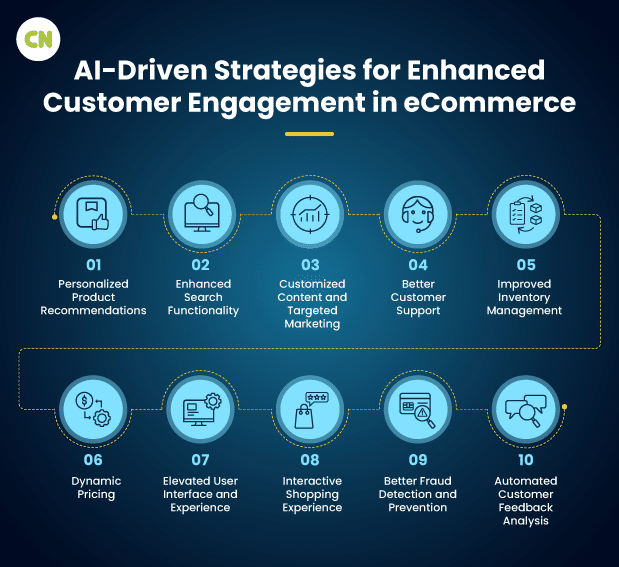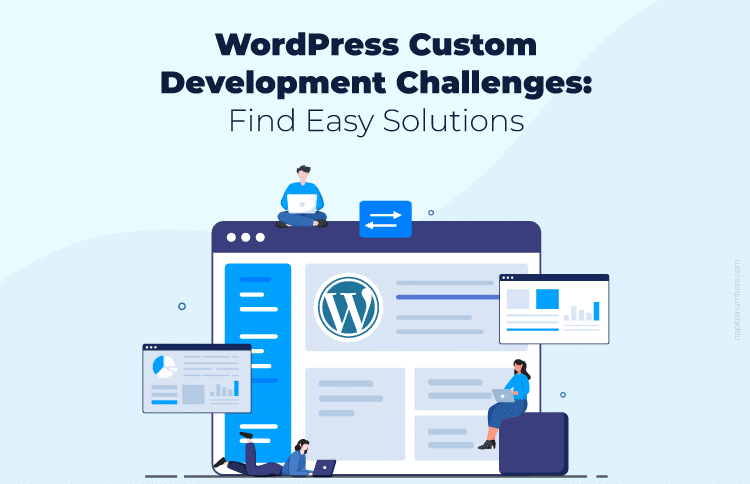AI in eCommerce: Shaping the Future of Customer Engagement
Table of Contents
In today’s eCommerce landscape, customer engagement is vital. It is the driving force behind sales growth, brand loyalty, and the enduring success of online retail businesses. As the digital marketplace becomes increasingly competitive, eCommerce businesses seek innovative ways to attract and retain customers. A key player in this arena is the integration of artificial intelligence (AI) into eCommerce strategies. AI is revolutionizing customer interactions with online stores, opening new pathways for engagement and forging stronger conne
But how does AI facilitate this shift? What are the mechanisms through which AI tools and technologies can enhance the customer experience and uplift engagement in your eCommerce store? The scope of AI in transforming customer interactions is broad and impactful, and delving into its specific roles and benefits is key for anyone involved in eCommerce. If you’re managing an eCommerce store or considering venturing into eCommerce website development, understanding the nuances of how AI can revolutionize customer engagement is crucial. Here, we will discuss these details, providing you with the insights you need to use the power of AI for your eCommerce platform.

1 Personalized Product Recommendations
AI improves shopping experiences by providing personalized product recommendations. It uses advanced algorithms to analyze customer data such as past purchases, browsing history, and search activities. By leveraging machine learning, these systems continuously evolve, becoming more adept at predicting customer preferences and behaviors.
The result is a highly tailored shopping experience for each customer. For instance, when customers visit an eCommerce site, AI algorithms work behind the scenes to curate a list of products they are most likely interested in. This makes the shopping experience more relevant and engaging and increases the likelihood of purchase.
Major eCommerce companies like Amazon and Alibaba have implemented these AI-driven systems. Their accurate recommendations often lead customers to products they need or desire, showcasing the impact of AI on personalizing shopping experiences.
2 Enhanced Search Functionality
AI enhances search functionality in eCommerce, making it much more intuitive and efficient for customers. Using natural language processing (NLP), AI allows customers to enter search queries in their everyday language and still get highly relevant results. This means a more natural and effective search experience, as the AI understands and processes the context and intent behind each query. Also, AI personalizes search results based on individual customer data, such as past browsing behavior and purchases, ensuring that the results displayed align more with each user’s preferences.
Moreover, AI consistently improves the accuracy and relevance of search outcomes. It learns from customer interactions, refining its understanding and response to search queries. This adaptive learning leads to quicker, more accurate searches, enhancing customer satisfaction. AI also brings advanced features like visual search, where customers can upload images to find similar products, making it easier for those who might not have the specific words to describe what they’re looking for. AI in eCommerce enhances the customer experience and fosters increased engagement, potentially leading to higher sales.
3 Customized Content and Targeted Marketing
Beyond product recommendations, AI extends its capabilities to content customization and targeted marketing. AI tools can create personalized marketing materials by analyzing customer data, from emails to targeted ads. The content of these materials is not randomly selected but is based on the analysis of individual consumer behavior and preferences.
For this, customers receive marketing messages that are highly relevant to their interests, increasing the chances of engagement and conversion. The impact of such targeted marketing is deep. It leads to a more engaged customer base, higher conversion rates, and increased customer loyalty. eCommerce businesses that use AI in this way can provide a more satisfying shopping experience and build a strong, loyal customer base.
4 Better Customer Support
AI in eCommerce is reshaping customer service by providing round-the-clock support through AI-powered chatbots and virtual assistants. Unlike human personnel, these AI tools are available 24/7, ensuring that customer inquiries are addressed at any time, without delay. They can handle various tasks, from answering frequently asked questions to assisting in transactions and troubleshooting.
Besides, by employing natural language processing (NLP), AI systems can understand and process customer queries conversationally. These systems can provide direct solutions or escalate complex issues to human representatives. AI’s ability to sort and prioritize inquiries based on urgency and complexity ensures customer complaints are handled more effectively, enhancing overall service quality.
5 Improved Inventory Management
AI-enhanced inventory management helps boost customer engagement in eCommerce by ensuring product availability and optimizing stock levels. By accurately predicting demand using AI algorithms, eCommerce platforms can keep popular items in stock, preventing frustrating out-of-stock scenarios for customers. This reliability in product availability is crucial for maintaining customer trust and satisfaction.
Also, AI-driven inventory systems enable dynamic adjustment of stock levels in response to real-time demand trends, ensuring efficient use of inventory and reducing instances of overstocking or stockouts. This efficiency streamlines the customer’s shopping experience by providing them with what and when they need it. Also, it creates a sense of reliability and responsiveness from the eCommerce platform, improving overall customer engagement and loyalty.
6 Dynamic Pricing
Dynamic pricing strategies in eCommerce, enabled by AI, adjust product prices in real time based on market factors and consumer behaviors. AI algorithms analyze demand trends, competitor pricing, and customer purchase history to set optimal prices. For example, prices may increase during peak demand periods for profit maximization and decrease during slower periods to attract customers and manage inventory.
This strategy also customizes prices based on customer profiles. AI identifies patterns in spending habits, offering personalized discounts to loyal or high-value customers while presenting standard pricing to new or infrequent shoppers. This customization maximizes revenue and customer loyalty, keeping businesses competitive.
7 Elevated User Interface and Experience
AI transforms customers’ interaction with eCommerce platforms, particularly through improved user interfaces and experiences. Generative AI, a cutting-edge AI technology, is at the forefront of this transformation. It tailors the user interface by analyzing browsing habits and purchase history. This means it can rearrange the layout of a website or app to show products and information that match individual user preferences, creating a more intuitive and personalized browsing experience.
Along with personalizing the interface, AI in eCommerce improves overall usability. It improves website performance, ensuring faster loading times and smoother navigation, which is vital for maintaining user engagement. AI also refines search functionalities, enabling users to find products faster and more accurately. These improvements in user experience, driven by AI, not only boost customer satisfaction but also encourage longer site visits and repeat purchases, leading to increased sales and customer loyalty.
8 Interactive Shopping Experience
AI-enabled augmented reality transforms the eCommerce shopping experience by allowing customers to see how products would look in real life before buying. This technology merges real-world environments with virtual images, enabling shoppers to visualize items in their own space through a digital device. For example, customers can preview furniture in their homes or try on accessories virtually. AI enhances AR by providing accurate and tailored visualizations based on the user’s surroundings and preferences.
This blend of AI and AR in eCommerce makes online shopping more interactive and boosts buyer confidence. It helps overcome the uncertainty of how a product looks or fits in a real-world context, often a hurdle in online shopping. This realistic preview can significantly reduce product returns and increase customer satisfaction. Also, the immersive and fun nature of AI-enabled AR enhances customer engagement, potentially leading to longer browsing sessions and increased sales.
9 Better Fraud Detection and Prevention
AI is a game-changer in fighting fraud in eCommerce, providing a much-needed layer of security for online transactions. As online shopping grows, so does the risk of fraud, making it essential to have strong protection. AI steps in here, using its advanced algorithms to scan transaction data for signs of fraud, like sudden, large purchases or orders from new locations. Catching these signs helps prevent fraud, keeping the business and its customers safe.
This AI-driven approach to fraud detection is also crucial for building trust with customers and shaping the future of client relations in eCommerce. When customers feel secure, knowing their personal and financial information is well-protected, they’re more likely to stay loyal to a platform. As AI improves at differentiating normal transactions from fraudulent ones, it reduces mistakes where normal purchases are wrongly flagged, ensuring a smoother shopping experience. Thus, AI stops fraud and strengthens the relationship between eCommerce sites and their customers.
10 Automated Customer Feedback Analysis
AI is transforming customer engagement in eCommerce by automating customer feedback analysis. Previously, understanding customer opinions was a slow process of manually reviewing feedback. Now, AI quickly analyzes large volumes of feedback, uncovering key trends and sentiments. This helps eCommerce platforms understand customer preferences and areas for improvement, enhancing customer engagement.
This rapid feedback analysis is vital for improving the customer experience. By swiftly addressing issues identified in feedback, such as product quality or website functionality, eCommerce platforms can boost customer satisfaction. Quick responses to customer feedback show that their opinions are valued and lead to immediate improvements. This enhances the overall service and fosters customer loyalty and engagement, keeping businesses in tune with customer needs and maintaining a competitive market presence.
Read More: The Impact of AI on Industries: What You Need to Know
Final Thoughts
Artificial intelligence (AI) has transformed customer engagement in eCommerce. By offering personalized experiences, enhancing customer service, and providing insightful data analysis, AI has set new benchmarks for customer satisfaction and loyalty. This technology has enabled eCommerce businesses to meet and anticipate customer needs, fostering stronger relationships and more meaningful interactions.
Looking to the future, the role of AI in eCommerce is set to become even more advanced. We can expect even better integrations, with AI increasingly understanding customer behaviors and preferences. Integrating AI with augmented reality promises to create more immersive and interactive shopping experiences. This advancement suggests a future where online shopping offers more than just transactions, providing unique and engaging experiences for every customer. It paves the way for businesses to achieve greater success in the online retail world.














